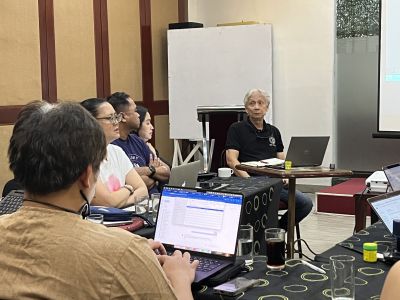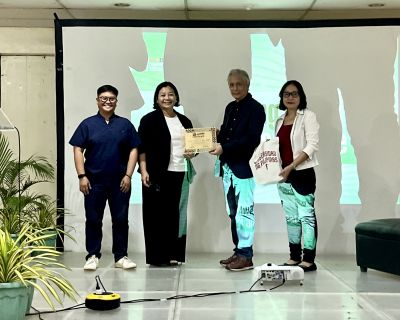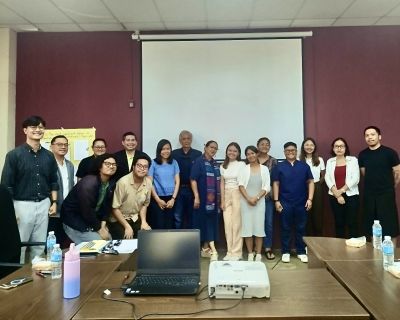
The UP ISC Research Project ISRGA2024-22: Interrogating Higher-Order Impacts of Disruptive Technologies on Quality Education (SDG4): A UP Community-Wide Anticipatory Study in Complexity under the Faculty of Information and Communication Studies (FICS) held a series of meetings and research workshops on 22 to 24 May 2025 in Cebu.

Principal Investigator Dr. Alexander G. Flor leads the Third Project Coordination Meeting.
On 23 May 2025, the research team, composed of the eight UP constituent universities, convened for their Third Project Coordination Meeting. Each CU Lead Collaborator shared updates on their ongoing research efforts in their respective campus unit. The meeting also covered ongoing administrative matters and included a briefing on the project’s strategic direction in light of recent adjustments to its timeline.
The session was followed shortly by a project writeshop, providing the team an opportunity to co-produce outputs on their initial findings and document key insights to outline possible next steps. The writeshop continued the following day to consolidate research findings towards the study’s overall objectives.
Participation in the 5th Annual DukiTuki Communication Program Research Forum

Dr. Alexander G. Flor (center) receives a certificate of appreciation from Dean Shane L. Carreon of the College of Communication, Art, and Design, Office of the Vice Chancellor for Academic Affairs Asst. Prof. Palmy Marinel P. Tudtud, and UP Cebu CU Lead Collaborator Dr. Crina E. Tañongon (left to right) for serving as a keynote speaker at the 5th DukiTuki Communication Program Research Forum 2025.
In a related engagement, Project Principal Investigator Dr. Alexander G. Flor also served as a keynote speaker at the 5th DukiTuki Communication Program Research Forum 2025 at the University of the Philippines Cebu on 22 May 2025. The theme Disruptive Currents: Reimagining Communication in an Era of Technological and Cultural Shifts gave way for Dr. Flor to share a compelling and witty address exploring the interrelationship of generation demographics and disruptive technologies, offering insights to help navigate a technology-adapted future.
Like the research project’s goals, he underscored the relevance of studying this phenomenon in the context of advancing quality education. He took this opportunity to extend an invitation to UP Cebu attendees to participate in the research project through a Most Significant Change (MSC) exercise.
Most Significant Change Exercise with UP Cebu
Three students, three faculty members, and one Research, Extension, and Professional Staff (REPS), including Dean Carreon of the College of Communication, Art and Design participated in the Most Significant Change (MSC) exercise. The session, which aimed to explore the participants’ stories of change on disruptive technologies such as Artificial Intelligence (AI), was facilitated by Dr. Benjamina Paula G. Flor, adjunct professor of FICS.

The UP ISC ISRGA2024-22 Research Team with Dean Carreon and selected UP Cebu students, faculty, and staff after the Most Significant Change (MSC) Workshop on 22 May 2025.
The UP ISC ISRGA2024-22 Research Project is anticipatory research that examines the impact of emerging disruptors such as artificial intelligence, virtual reality, and quantum computing on educational systems and institutions. By employing scenario-building methodologies, the study aims to determine the primary, secondary, tertiary, and unintended consequences of these technologies. The insights generated may serve as a valuable reference for technology-related policy formulation, particularly within the UP system.
Written by Maria Andrea Bodaño | Edited by Joy abigail Rebulanan








